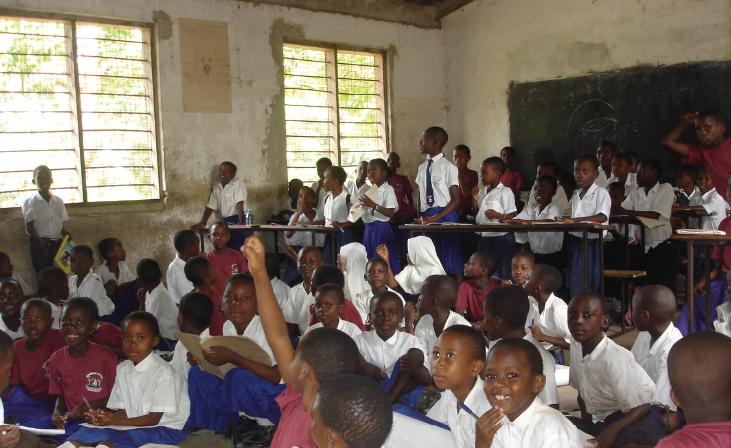I just came across a report – prepared by Ayub Roba and Debbie Budlender, as part of the Learning Program of the IBP’s Partnership Initiative – that presents a case study of the impact that civil society budget analysis and advocacy can have on government budget policies, processes, and outcomes; particularly as these relate to efforts to eliminate poverty and improve governance.
I know most of you are too lazy to read these kinds of reports, so I decided to post a few excerpts that will open your eyes and learn what goes on behind those closed doors. And hopefully, many of you will go through the whole report. It’s only 4 pages (with a lot of graphics)!
When developing its (CSO’s) Programme Strategy for 2004-2007, HakiElimu noted improvements in enrollment levels, but identified a lack of attention to education quality. Based on these concerns, it crafted and implemented a campaign that led to significant improvements in Tanzania’s schools.
What happened during HakiElimu’s campaigns:
A key component of HakiElimu’s strategy was to use popular media to educate the public and foster debate on Tanzania’s school system. Its dramatic radio spots on the delays in payment of salaries and the other inconveniences that teachers had to endure to get their salaries significantly raised public awareness.
The government reacted strongly to HakiElimu’s campaign by issuing an interdict against it in September 2005 and notifying all regional and local government authorities that the organization was banned from all its activities in schools. Ironically, the national debate that ensued further enhanced public awareness of the organization’s campaign. More publicity followed when the then President of Tanzania, Benjamin Mkapa, reproached HakiElimu for “misinforming the public about the state of education in the country.” Mr. Mkapa also expressed support for the education ministry’s ban on HakiElimu.
In December 2005 President Jakaya Kikwete came to power at a time when many articles, letters to the editor, and TV and radio discussions by journalists, citizens, and opinion makers had condemned the government’s hostility towards HakiElimu. President Kikwete’s administration appeared to be influenced by this public opinion when, after a meeting with teachers, President Kikwete formed a task force to look into teachers’ demands, including late payment of salaries.
In an apparent step backward, the Prime Minister’s Office issued a letter on 5 December 2006 prohibiting HakiElimu’s publications and advertisements on the grounds that they were contrary to public interest. The interdict and this subsequent prohibition letter also sparked a debate in Parliament when a member of parliament (MP) demanded that HakiElimu be punished because its radio and TV spots disparaged the government. Other MPs, however, questioned the merit of the interdict. The media coverage generated during the debate also reveals that many opposed the government’s encroachment on the freedom of citizens and civil society represented by its actions against HakiElimu.
For more about what happened next – from the resolution to HakiElimu’s success to educate and mobilize the public – continue to read here…



These type of case studies are widely used by donors and their recipients to make sure the news is good – often the terms of reference clearly stipulate that success stories are required. One Terms of Reference I was given recently did just that – asking me to put together some case studies to illustrate ‘success stories’. This was to be part of what was described as an evaluation.
Believe me, case studies of this sort don’t tell you what goes on behind closed doors.
In what ways is HakiElimu a success? How? What troubling issues are raised by its approach? This report won’t go into that.
Nice points, anon.
Personally, I am hugely biased (critilal is a better word, I guess) when it comes to reports like these, as I always try to find graphs and make sense out of them. I gave it a shot and I was hoping they would just give us a glimpse of what’s happening with grade seven, form four and form six (national) results.
Couldn’t they even mention the national examination results? Why the system is still failing?
Anyways, anon, when you have time plz do share your ideas with us. An outline will be more than enough…
The ban of HakiElimu was the most embarassing move by the TZ Gov’t regarding the education sector, let alone the numerous failures the Ministry of Education has been involved with in the miseducation of our future Tanzanians. Why can’t the government be criticised? I think we need more organizations like ‘HakiElimu’ on the field, then we shall see if they ban all of them. In my opinion the Gov’t should revere HakiElimu – based on past experience we know the Gov’t doesn’t know what is necessarily happening on the ground. So they should support HakiElimu’s initiatives for providing necessary information with regards to shortcomings as they see them in the education sector – either communicated directly to the government through policy forums or in public campaigns. The ban on HakiElimu just shows how autocratic our Gov’t can be.